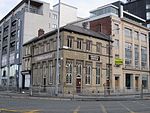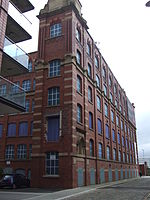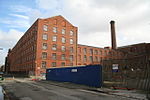Ancoats

Ancoats is an area of Manchester, England, next to the Northern Quarter, the northern part of Manchester city centre. Historically in Lancashire, Ancoats became a cradle of the Industrial Revolution and has been called "the world's first industrial suburb". For many years, from the late 18th century onwards, Ancoats was a thriving industrial district. The area suffered accelerating economic decline from the 1930s and depopulation in the years after the Second World War, particularly during the slum clearances of the 1960s. Since the 1990s, Ancoats' industrial heritage has been recognised and its proximity to the city centre has led to investment and substantial regeneration. The southern part of the area is branded as New Islington, by UK property developers Urban Splash, while the north retains the Ancoats name, with redevelopment centred on the Daily Express Building. In 2021 a plaque was put in place acknowledging Ancoats' status as a Little Italy.For the purpose of local government elections, the area is part of the Ancoats and Beswick ward on Manchester City Council.
Excerpt from the Wikipedia article Ancoats (License: CC BY-SA 3.0, Authors, Images).Ancoats
Great Ancoats Street, Manchester City Centre
Geographical coordinates (GPS) Address Nearby Places Show on map
Geographical coordinates (GPS)
| Latitude | Longitude |
|---|---|
| N 53.483333 ° | E -2.229722 ° |
Address
Nuovo Apartments
Great Ancoats Street 59
M1 1AL Manchester, City Centre
England, United Kingdom
Open on Google Maps









